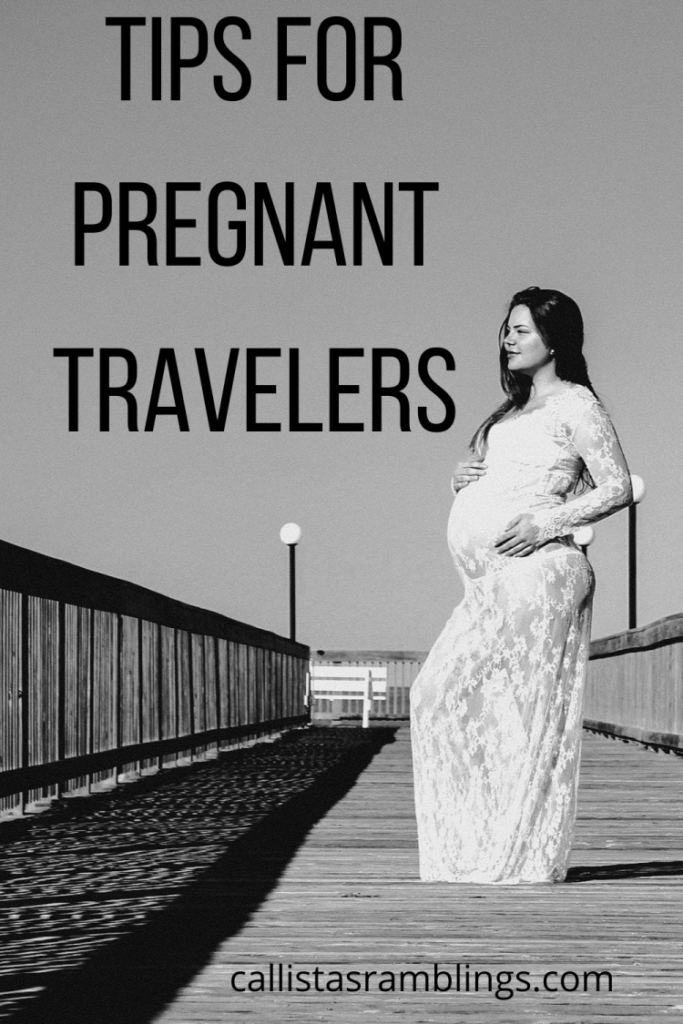For pregnant women, travel can be a bit more difficult than it would seem. However, there are plenty of precautions that you should take to ensure your safety while traveling or visiting other countries for trips; these tips will help keep the risks minimal and reduce any chances at all concerning potential side effects from exposure during pregnancy like morning sickness or heartburn.
This is a guest post by Amy. See the author bio at the end to learn more.
Tips for Pregnant Travelers
Check with your doctor before traveling
If you are planning to go abroad, it’s important to ask your doctor for advice about safe travel destinations. Some areas have very serious health risks associated with them.
Choose low-risk countries
Countries that are less developed or places that are known for high incidences of HIV-AIDS and malaria are not the best options during pregnancy, especially if you are unable to take medications before, during, or after your trip.

Travel without excess baggage
Pregnancy weight gain is common but try to stay fit and healthy through proper diet and exercise before you go on a long flight or journey. If possible, don’t bring unnecessary clothing or supplies that aren’t needed; you’ll save yourself some money for souvenirs along the way and make traveling a little easier.
Book flights during the early morning or later in the evening
If possible, try to book your flight for either early morning or later in the evening; this is because the pressure on your body increases when you’re higher up (particularly if you’re flying near the poles) and also because staying seated for a long time isn’t good for your body.
Be sure to drink plenty of water and natural juices
Drink around 2-3 liters of water per day, including natural juices and decaffeinated tea or coffee – caffeine restricts blood flow which can make you feel faint during pregnancy.
Avoid drinking tap water as it’s not safe for consumption in most countries.
Pack a travel sickness kit
You may want to pack medications for nausea and vomiting as well as vitamins, supplements, and additional mini snacks for your journey. You should also consider packing a change of clothes or two with you – even if it means bringing an extra bag along.
Be careful with the sun
Avoid the sun when possible; put on sunscreen, wear protective clothing and drink lots of water to keep yourself hydrated. You should also avoid tanning beds or other questionable forms of indoor tanning.
Go in for a pre-travel checkup
It’s always a good idea to go in for a pregnancy checkup before traveling if you’ve never been pregnant before. The checkup will include a health assessment and may identify any concerns you might have about traveling while pregnant like gestational diabetes or Rh incompatibility.
Prepare for the unexpected!
Just in case something does go wrong along the way, make sure you know what to do; most countries (and even some states!) have a medical repatriation insurance plan that will allow you to be flown back home at the expense of the airline. Being prepared is generally the best policy; it could make traveling easier and less stressful if something unexpected happens.
Pack extra snacks
If you are nauseated or have an upset stomach during your flight, try to eat healthy snacks like fruit and vegetables. Try to avoid greasy or heavy foods that may further upset your digestive system. Avoid caffeine as well if you are experiencing the symptoms of morning sickness.
Pregnancy is considered a safe time for travel. But some precautions should be taken before you jump on a flight or board a train.
If you are pregnant, it is important to stay in shape and get proper nutrition for yourself and your growing baby. Walking during the airport terminal can help workout muscles used for walking upstairs. If possible walk instead of using other forms of transportation.
Use safe modes of travel
If you are more than 28 weeks pregnant, it is important to use caution when traveling by air or train. Many precautions should be taken with this type of travel including checking with your physician before booking your trip. You may consider the less strenuous options of car travel, bus travel, or boat travel if your pregnancy is more advanced.
Keep hydrated
Staying well-hydrated can help with morning sickness and fatigue while traveling. It is important to drink at least 8 oz of water before getting on a plane, train or bus and then drinking 2-3 oz about every hour that you are in transit. If your body is not getting the hydration that it needs then you may be prone to feeling nauseous and dizzy. Snacks such as fruits and vegetables can also help maintain healthy hydration levels.

Be cautious of the sun and heat
The light and warmth from the sun can affect your pregnant body during your trip. If traveling by car during the day, be sure to keep your skin covered and wear a hat. Wear sunscreen on any exposed areas. If it is hot outside or you are feeling dehydrated, try not to rest in direct sunlight for too long.
Raising awareness of the need of pregnant women while traveling is important to all travelers and residents of this planet. It is important to be safe and smart when on a journey. Pregnancy is a beautiful thing that should not have any limits or boundaries put on it.
Maintain normal blood pressure levels
If you have a history of high blood pressure, you need to make sure that it does not become elevated while traveling. The added stress from travel can increase your blood pressure levels which is bad for both you and your baby. Try to maintain regular check-ups with your physician before going on a trip if this applies to you. Avoid traveling on long-haul flights for this reason and if feasible, try and do the majority of your traveling by car instead.
Traveling while pregnant can be a wonderful experience and it should not keep you from enjoying yourself during your trip. However, some precautions should be taken to ensure everyone’s safety.
Be wary of strangers on the road
Many people will be eager to help you during your trip so do not hesitate to ask for assistance when needed. However, it is important to remember that some people may wish to cause harm or take advantage of pregnant women in need of assistance. If someone offers to help you but makes you feel uncomfortable then do not hesitate to decline their help.
Be wary of chemicals and cleaners
There are many cleaning products used by the industry today that may be harmful to a pregnant woman’s body if she is exposed to them during her trip. Be sure not to expose yourself or your baby to chemicals such as those found in cleaning supplies, pesticides, paint fumes, etc. If you do become exposed or come in contact with something dangerous, it is important to seek medical attention immediately.
Get travel insurance that will cover medical expenses
Not all travel insurance is the same. It is important to obtain a plan that will cover medical expenses for you and your unborn child if necessary. Your regular health insurance will not cover pregnancy-related conditions or complications abroad so make sure that your insurance plan has these options before going on a trip with your family.
Final Words
Pregnancy is a wonderful and special time and it should not be limited by your particular situation. However, just as all people should be safe and sound regardless of their circumstances, pregnant women should apply the same rules to themselves. With these few pointers, pregnant women should be safe and sound when they travel.
Author Bio:
Amy has a wealth of parenting experience, from when she was an expectant mother with her own toddler to now being the parent of both a teenager and preschooler. Her blog AmyandRose is aimed at simplifying life for new parents as they navigate their way through parenthood while balancing other aspects in life.





Speak Your Mind